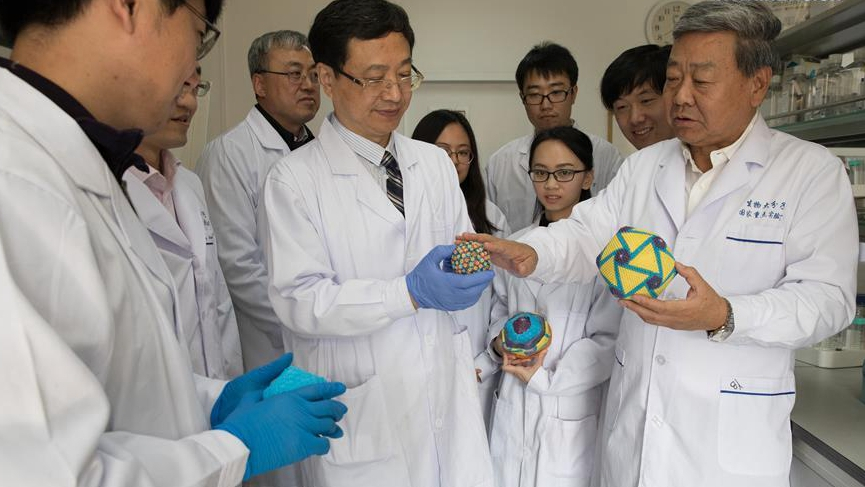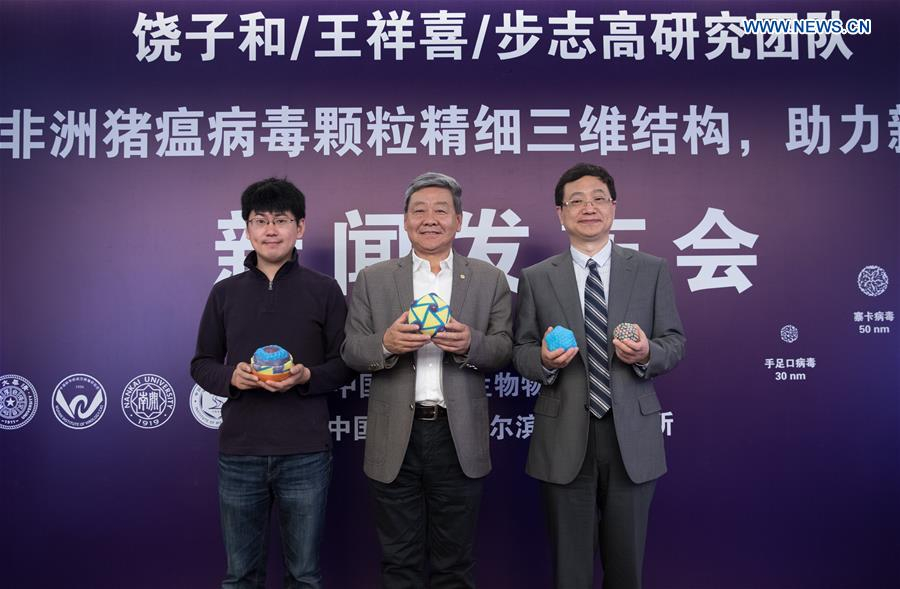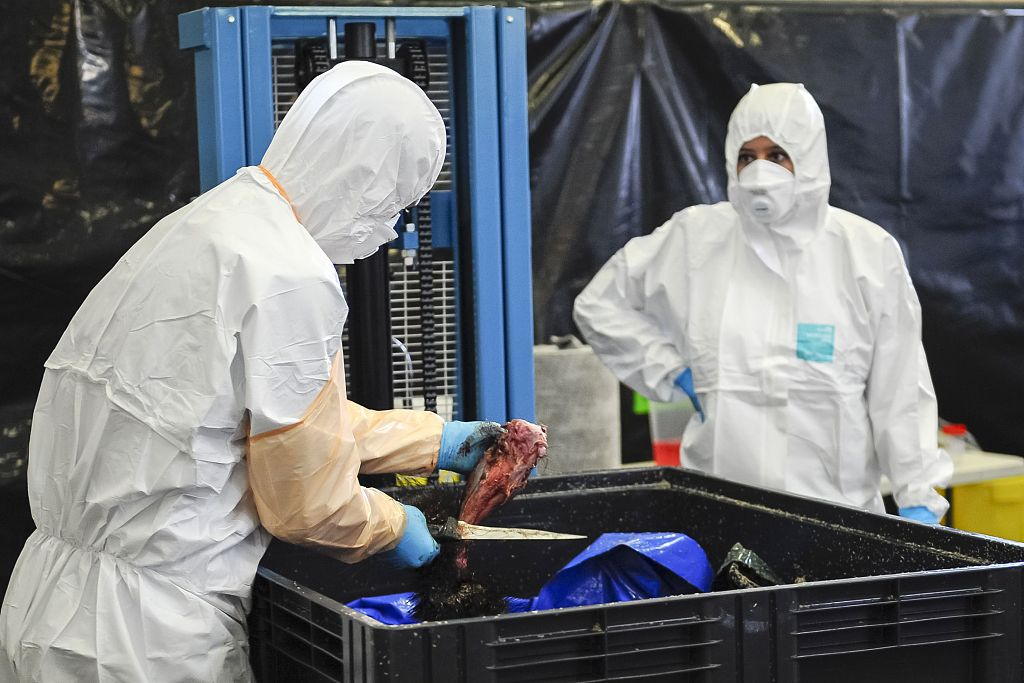
Rao Zihe (R, front), an academician with the Chinese Academy of Sciences (CAS), Bu Zhigao (C, front), director of the Harbin Veterinary Research Institute of the Chinese Academy of Agricultural Sciences (CAAS), and Wang Xiangxi (L, front), a researcher at the Institute of Biophysics of CAS, are seen at a laboratory of the Institute of Biophysics of CAS in Beijing, Oct. 18, 2019. /Xinhua
Rao Zihe (R, front), an academician with the Chinese Academy of Sciences (CAS), Bu Zhigao (C, front), director of the Harbin Veterinary Research Institute of the Chinese Academy of Agricultural Sciences (CAAS), and Wang Xiangxi (L, front), a researcher at the Institute of Biophysics of CAS, are seen at a laboratory of the Institute of Biophysics of CAS in Beijing, Oct. 18, 2019. /Xinhua
Editor's note: David Lee is a consultant and author based in Beijing who focuses on energy, health, international politics and international development. The article reflects the author's opinion, and not necessarily the views of CGTN.
Global animal protein supply has been under increasing pressure since the African Swine Fever (ASF) outbreak in China about a year ago. As the ASF situation continues to unfold, it is driving global pork prices higher and is increasingly becoming a global, instead of a regional, supply crisis.
Given the upcoming Chinese New Year in January 2020 where pork represents a key food ingredient, the supply strain will only become more serious.
More importantly, considering the massive culling of pork in China, where up to 50 percent of pork is produced, and across the region in Vietnam, Thailand, and other countries, a large portion of the pork supply is lost, and there is no way to fill in the supply gap in the foreseeable future. Therefore, market fundamentals clearly indicate that the supply crisis is here to stay.
The pork supply crisis must be seen as a real global emergency that affects the livelihood of millions of people. In this case, the shortage of animal protein supply constitutes a serious threat to nutrition and health of populations living in developing countries. Notably, the debate about reducing meat consumption as a way to mitigate climate change does not apply to vast areas in China and other developing countries, where adequate animal protein supply remains a livelihood goal.
As an encouraging sign to address the ongoing crisis in a meaningful way, Chinese scientists are making some remarkable breakthroughs in understanding the ASF virus. The detailed structure of the virus has been discovered by Chinese scientists, offering clues as to how the virus attacks host cells while evading the immune system in infected pigs. The latest discovery helps to inform future research into developing an effective vaccine. The findings have been published in the latest Science magazine.

Rao Zihe(C), Bu Zhigao (R) and Wang Xiangxi (L) pose for photos at a press conference held by the Institute of Biophysics of CAS in Beijing, China, Oct. 18, 2019. /Xinhua
Rao Zihe(C), Bu Zhigao (R) and Wang Xiangxi (L) pose for photos at a press conference held by the Institute of Biophysics of CAS in Beijing, China, Oct. 18, 2019. /Xinhua
Admittedly, the encouraging research outcome is only the first step of a long journey towards a well-coordinated global response to an unfolding crisis. Conventional wisdom believes that there's no effective treatment for the ASF. Following this line of thinking, the focus is to euthanize all pigs on affected farms and to identify the source of the outbreak.
Nevertheless, the discovery of the virus structure points to the long-term solution in the form of an effective vaccine, but immediate steps must be taken effectively to address the threat of increasingly wider outbreaks.
Apart from culling the herds, other meaningful measures can help. For instance, apply strict biosecurity measures specific to individual swine producing sectors, strengthen monitoring and surveillance in the transport of pigs and pork products, cultivate preparedness for improved early warning and response, and ensure clear communication with the commercial sector and the public, among others.

Researchers carry out an autopsy on a wild boar to determine by analysis whether the wild boar was suffering from the African swine fever virus (ASFV), Virton, Belgium, Oct. 19, 2018. /VCG Photo
Researchers carry out an autopsy on a wild boar to determine by analysis whether the wild boar was suffering from the African swine fever virus (ASFV), Virton, Belgium, Oct. 19, 2018. /VCG Photo
The international community has been slow to address the current ASF outbreaks. To a large extent, slow reaction has resulted in the biggest disruption of animal protein supply in the global market since the outbreaks of mad cow disease and the bird flu.
The international community must learn from this and draw lessons from the past when addressing animal disease containment. While emergency response measures must be taken effectively and immediately, long-term solution driven by basic scientific research shall be encouraged.
As China's latest ASF research provides concrete discoveries, the scientific community should have the opportunity, i.e., financial support and political backing, to explore further the possibility of any vaccine. Of course, this belief in long-term scientific advancement does not clash with the current proven strategy of culling and containment.
Again, in vast regions across the world, the local populations cannot afford the luxury of talking about reducing meat consumption as part of the effort to address climate change. Many disadvantaged people need adequate intake of animal protein, just to sustain life and ensure well-being.
To conclude, animal disease containment should be a priority issue. From beef to poultry and to pork, repeated animal protein supply interruptions should have educated the global community and a more systematic approach, to combine government, industry, and scientific communities, should be put in place to enhance response and mitigation.
(If you want to contribute and have specific expertise, please contact us at opinions@cgtn.com.)